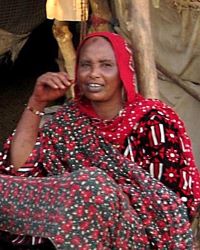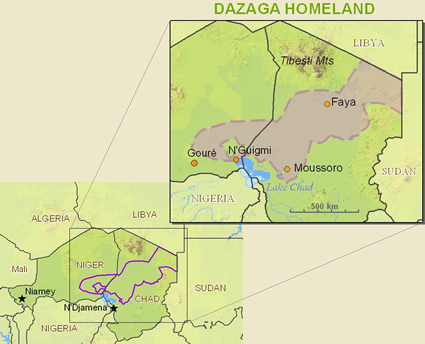The Daza are a rugged Muslim people who live in southwestern Chad and Niger. Those in Chad primarily inhabit the southern fringes of the Sahara Desert. They have the reputation of being fierce and independent, and they are organized by tribes and clans. Although their tribal chiefs have some influence, they have little actual control over the clans.
The Daza are known for their fighting and are disliked and feared by some of their neighbors. Many Daza, including the women, carry daggers under the sleeves of their garments. They think highly of themselves and take pride in their reputation as warriors. They are well known for their ability to go for long periods of time with little food or water.
The Daza have traditionally been a nomadic, pastoral people, but the population is presently divided between those in rural camps and a lesser number in the small towns. Many have been forced to leave the nomadic lifestyle because of the droughts of recent decades. In the past, the Daza herded cattle, camels, and goats. Cattle are raised less often now, as the Sahara continues to advance southward, destroying the pasture lands necessary for their support.
The basic diet of the Daza consists of cooked millet eaten with a sauce, which usually contains dried tomatoes, onions, and various leaves. Meat is occasionally added to the sauce but is eaten infrequently, as the people are generally poor. Milk is obtained from camels and goats, and dates are cultivated in some areas. Drinking strong, sweet tea is a daily part of Daza social life.
Marriages are often arranged, but couples may have some voice in the matter. Camels, tea, and sugar are usually given as gifts to the bride's family, and gifts are also given to the groom's family. The Daza practice polygamy (have multiple spouses), but many men can afford to have only one wife. Because it is important to have children, a second wife is especially desirable, if the first wife does not conceive. Men are the heads of their families, but Daza women are relatively independent, compared to many neighboring groups. Unfortunately, divorce is common among the Daza.
Being Muslim is a large part of Daza cultural identity, and the Daza are practically all Muslim. There is great social pressure to participate in the prayers and the month-long fast during Ramadan, and much attention is paid to the giving of alms. Though staunchly committed to Islam, the Daza do incorporate some animism (the belief that non-human objects have spirits) in their religious activities.
Community adherence to Islam is very stable, but the impact on individual character is not necessarily deep. There is evidence that some are Muslim in name only, especially among the youth; nonetheless, there are still many very sincere, devout Muslims among the Daza.
As a whole, the Daza are very poor and diseases are common health concerns. Lack of water and frequent droughts often plague them. There are no medical facilities available to most Daza. Even in the few towns where there are medical clinics, medicines are often not available and clinic conditions are inadequate. Common social problems include divorce, adultery, prostitution and slavery.
Ask God to raise teams of medical missionaries to go to Chad and work among the Daza.
Ask the Lord to call people who are willing to go to Chad and minister the love and compassion of Christ to the Daza.
Ask the Holy Spirit to send dreams and visions to Daza family leaders that will open their hearts to the King of kings.
Pray that God will deliver the Daza from their violent, warring lifestyle and lead them into productive work.
Scripture Prayers for the Daza in Niger.
https://www.britannica.com/topic/Daza
| Profile Source: Joshua Project |











